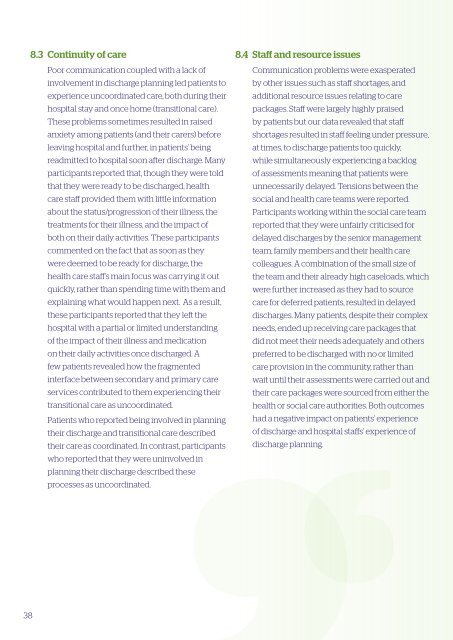Hospital Discharge
3Jzx309Yruj
3Jzx309Yruj
Create successful ePaper yourself
Turn your PDF publications into a flip-book with our unique Google optimized e-Paper software.
8.3 Continuity of care<br />
Poor communication coupled with a lack of<br />
involvement in discharge planning led patients to<br />
experience uncoordinated care, both during their<br />
hospital stay and once home (transitional care).<br />
These problems sometimes resulted in raised<br />
anxiety among patients (and their carers) before<br />
leaving hospital and further, in patients’ being<br />
readmitted to hospital soon after discharge. Many<br />
participants reported that, though they were told<br />
that they were ready to be discharged, health<br />
care staff provided them with little information<br />
about the status/progression of their illness, the<br />
treatments for their illness, and the impact of<br />
both on their daily activities. These participants<br />
commented on the fact that as soon as they<br />
were deemed to be ready for discharge, the<br />
health care staff’s main focus was carrying it out<br />
quickly, rather than spending time with them and<br />
explaining what would happen next. As a result,<br />
these participants reported that they left the<br />
hospital with a partial or limited understanding<br />
of the impact of their illness and medication<br />
on their daily activities once discharged. A<br />
few patients revealed how the fragmented<br />
interface between secondary and primary care<br />
services contributed to them experiencing their<br />
transitional care as uncoordinated.<br />
Patients who reported being involved in planning<br />
their discharge and transitional care described<br />
their care as coordinated. In contrast, participants<br />
who reported that they were uninvolved in<br />
planning their discharge described these<br />
processes as uncoordinated.<br />
8.4 Staff and resource issues<br />
Communication problems were exasperated<br />
by other issues such as staff shortages, and<br />
additional resource issues relating to care<br />
packages. Staff were largely highly praised<br />
by patients but our data revealed that staff<br />
shortages resulted in staff feeling under pressure,<br />
at times, to discharge patients too quickly,<br />
while simultaneously experiencing a backlog<br />
of assessments meaning that patients were<br />
unnecessarily delayed. Tensions between the<br />
social and health care teams were reported.<br />
Participants working within the social care team<br />
reported that they were unfairly criticised for<br />
delayed discharges by the senior management<br />
team, family members and their health care<br />
colleagues. A combination of the small size of<br />
the team and their already high caseloads, which<br />
were further increased as they had to source<br />
care for deferred patients, resulted in delayed<br />
discharges. Many patients, despite their complex<br />
needs, ended up receiving care packages that<br />
did not meet their needs adequately and others<br />
preferred to be discharged with no or limited<br />
care provision in the community, rather than<br />
wait until their assessments were carried out and<br />
their care packages were sourced from either the<br />
health or social care authorities. Both outcomes<br />
had a negative impact on patients’ experience<br />
of discharge and hospital staffs’ experience of<br />
discharge planning.<br />
38


